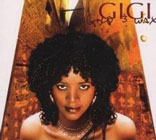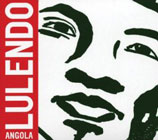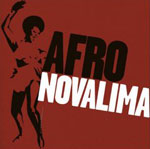Home » Jazz Articles » African Jazz » Out of Africa: Ethiopia, Angola, Peru
Out of Africa: Ethiopia, Angola, Peru
The Africans, however, are listening to very different music, so global Afro-pop has emerged as a weird, rich and rewarding contradiction in terms. The phenomenon has been advanced by expatriate musicians (particularly in Paris and London) and producers who weave many other threads into the fabric, drawing from regional and contemporary styles, incorporating a huge range of instrumentation.
In this article: Ethiopian singer Ejigayehu "Gigi" Shibabaw's second release relies upon American producer Bill Laswell's steady production and a shifting cast of international collaborators. Angolan singer, guitarist and likembe player Lulendo moved to Paris over two decades ago, leaving his music in a more and more hybridized state, as evident on his second album. And Novalima, an exhilarating Peruvian fusion of electronic production with echoes of the West African diaspora, takes ancient African rhythmic traditions into the 21st Century.
 Gigi
Gigi
Gold & Wax
Palm Pictures
2006
It's been five years since Ejigayehu "Gigi" Shibabaw's self-titled debut, which brought a lot of deserved international recognition to the Ethiopian singer's ethereal, floating voice—not to mention the production values of her husband, Bill Laswell. In fact, Gigi's sound has become synonymous with Laswell's thick, rich production on subsequent releases as well, including the "reproduction and mix translation" of her debut on Illuminated Audio (Palm Pictures, 2003) and the collaborative "Ethiopian soul music" on Abyssinia Infinite's Zion Roots (Network, 2003).
If anything, Gold & Wax is true to the pattern, and that's a good thing, in a way. Gigi still carries the lilting melodies in characteristically understated fashion, shaping each phrase she delivers with an ear for the sound and flow of the greater whole. Her collaborators include a variety of globetrotting alternative music legends, like Norwegian trumpeter Nils Petter Molvaer and West African griot Foday Musa Suso, several of whom have been running with Laswell for quite some time. There's no way to know where each of Gigi's eighteen named collaborators actually perform. But in some sense that's a totally irrelevant question, since the overall sound is quite consistent and the individual voices comprise a nearly orchestral whole.
"Salam," which rides Bernie Worrell's organ foundation, harkens back to the "little big band" arrangements of funky Ethiopian pop groups from the '70s (some recently documented on Buda Musique's Ethiopiques series). As Gigi unwinds the thread of the melody, she pauses to trade off with brief horn fanfares. Her repeated chorus of "Salaam Alaikum" communicates peace and welcome. (Curiously, her passing mention of the late Ethiopian emperor Haile Selassie carries a double meaning relating to the Jamaican Rastafarian faith, which is dedicated to Selassie and was largely reponsible for the birth of reggae and dub styles. Laswell's heavy, low bass and detailed production persistently echo the deepest roots of dub.)
"Utopia," the only song with English lyrics, hints at the uplifting, celebratory messages in the rest of this music. Interestingly, its raw drum-n-bass foundation (as on "Anten" a few tracks earlier) manages to fit into an organic whole. The paced, nine-minute "Jerusalem" is a stew of fermenting sounds, some obviously electric and others acoustic, but quite pleasing overall.
Gold & Wax is an affable, friendly record which is easy to enjoy and detailed enough to reward repeated spins. It's no particular reinvention of the sound that Gigi has explored since she first appeared on record—and she needs to do that soon, lest she glue herself down in one spot. Maybe it's time for something new? Perhaps something not quite so, um, Laswellized? We'll see if Gigi can be bold enough to break her own mold.
 Lulendo
Lulendo
Angola
Buda Musique
2006
Some of the music that's coming out of Paris these days is exceptional, no matter what your race or nationality. Lulendo, who grew up in northwest Angola, emigrated to Paris in 1982; since then, he's released two full albums, the latest of which is titled after his homeland. Angola is so thickly embedded with catchy grooves that Lulendo's vocals sometimes seem like merely a flexible adhesive that holds all the parts together.
In addition to singing (and composition), Lulendo also plays likembe (thumb piano) and guitar on the record. But the sixteen supporting musicians who sprinkle strings, keyboards, woodwinds and drums in the mix are largely responsible for endowing each of these twelve songs with its own particular character, presumably channeled through the perky, shifty arrangements by pianist Lalo Zanelli and Claude Di Bongue (who split the tracks down the middle).
Lulendo's tendency for polyphonic sound manifests itself in the carefully layered voices and counterpoint on "Elembo," one of four songs in Lingala. (All the lyrics, whether in Portuguese, French, Lingala or Kikongo, sometimes mixed, appear in the liner notes without translation.) The title track recalls the simple, upbeat folk optimism of Cameroonian pop star Henri Dikongue, though the peppery drums and cello add additional flavors. "Angola" and the raucous, guitar-driven "Sambalele" are the high points of the record, not least because they're so catchy they're practically contagious.
Not all of the songs reach such heights. The countrified "Maman" (fully embroidered with Claude Samard's pedal steel guitar) lags in a soft, droopy way. The next piece features the likembe and flute in attractive central roles, but they're more or less sunk by the accompanying flat programming.
Those two false steps are the exception rather than the rule, and they pass by quickly enough to be soon forgotten. Something tells me that this disc was carefully tailored for the market, among other reasons because every song is pretty close to four minutes long. But that's fine. The music is good fun: diverse, danceable and extremely groovy. It's okay to take off your thinking cap once in a while.
Visit Lulendo on the web.
 Novalima
Novalima
Afro
Quango
2006
The idea of a diaspora, which refers to a group of people displaced from their homeland, surfaces in more than one way on Afro. First, only one of the four Lima-born producers who formed Novalima in 2001 was actually based in Peru; the others had found new homes in Barcelona, London and Hong Kong. Their 2003 self-titled debut was recorded around the globe, mixed in London, and mastered in New York.
But the biggest manifestation of the diaspora surfaces in the music they make on Afro, a collection of adapted Afro-Peruvian songs whose origins date back to the dark age of slavery and, of course, the West African roots of the slaves themselves. In a sense, this music of the African diaspora runs parallel to similar strands in Cuba (eg. danzón, changüi, son) and the United States (blues, gospel), though it's flavored with its own particular regional instrumentation, vocal styles and song forms.
There's a huge leap in translation between the ancient folkloric origins of this music and their realization within a fully electronic context, however, which is what makes Afro so interesting. (This disc was mostly recorded in Lima, taking advantage of substantial local talent.) Novalima retains traditional Afro-Peruvian instruments like the cajón, quijada and congas, but in the process of assembling these thirteen tracks, the producers also draw from dub (emphatic bass, reverberant effects) and contemporary electronica (rich textures, multitracking, programming).
On first glance, that might seem like a contradictory and potentially toxic combination, but the organic quality of the material seems to be largely strengthened, rather than weakened, by the production. The vocals help a lot with this. On the opening "Chinchivi," they are so upbeat they practically float, and on "Mandinga" they somehow sound dark and ancient, mixing up references to chains with a sampled male voice saying "let's dance, let's have fun!"—before heading into a clubby downtempo mode punctuated by electronic beats and trumpet riffs.
The album as a whole is nicely integrated, shifting around to maintain interest, but it always sticks close to its roots and consistently exudes a welcoming aura.
Visit Novalima on the web.
Tracks and Personnel
Angola
Tracks: Rainha; Mandingo Sound; Bandeko; Maseke; Sambalele; Zelie; Angola; Elembo; Maman; Zibula Mbundu; Pesa; Ayaye.
Personnel: Lulendo: vocals, likembes, guitar; Shana: vocals (2,3,5,7,10,12); Claude Di Bongue: guitars, organ, melodica, programmed drums (2,4,5,9,11,12); Lalo Zanelli: piano, human box, metal pupitres, vocals, programming (1,3,6,7,10); Rody Cereyon: bass (2-5,7,9-12); Fabrice Drigues: percussion, drums (1-7,9-12); Joao Motta: guitar (1,3,7); Lameck Macaba: guitar (8); Philippe De Sousa: Portuguese guitar (7); Denis Tchangou: drums (7); Gwenaël Celerin: drums (2); Sedef Ercetin: cello (1,7); Fabrice Fenoglieto: bass (1); John Anthony Helliwell: clarinet, soprano saxophone (2,11); Didier Lockwood: violin (3); Claude Samard: pedal steel (9); Magic Malik: flute (10).
Gold & Wax
Tracks: Semena-Worck; Anten; Jerusalem; Salam; Gomelaleye; Ambasale; Hulu-Dane; Utopia; Acha; Marena-Wotetea; Enoralehu.
Personnel: Gigi: vocals; Abegasu Shiota: electric piano, organ, synthesizer, horn arrangements; Bernie Worrell: electric piano, organ, synthesizer; Nils Petter Molvaer: trumpet, electronics; Moges Habta: tenor saxophone; Assaye Zegeye: kirar, masinko; Buckethead: electric guitar; Bill Laswell: bass, guitar, synthesizer, electronic percussion; Robert Musso: acoustic guitar; Ustad Sultan Khan: sarangi, vocals; Karsh Kale: drums, tabla, electronic percussion; MIDIval Punditz: beat/sound construction; Serath "Skizz" Fernando: beat/sound construction; Foday Musa Suso: dousson n'goni; Lili Haydn: violin; Aiyb Dieng: chatan, jembe, congas, bells; Material Strings arranged and conducted by Karl Berger; DXT: third stage pro-tools navigator.
Afro
Tracks: Chinchivi; Bandolero; Malato; Machete; Candela; Mandinga; Zamba Lando; Ay Bembe; Toromata; Cardo; Alcajazz; Mayoral; Regresa/Con La Capilla.
Personnel: Novalima producers: Grimaldo del Solar, Carlos Li Carrillo, Rafael Morales, Ramon Perez Prieto. Novalima musicians: Milagros Guerrero, Juan Medrano "Cotito," Constantino Alvarez, Nicomedes Santa Cruz, Lucila Campos, Zambo Cavero, Juan Medrano Cotito, Mangué Vaquez, Milagros Guerrero, Oscar Avilés Jr., Pedro Urrutia, Carlos Uribe.
< Previous
A Greater Love
Next >
Think Like the Waves
Comments
Tags
For the Love of Jazz
 All About Jazz has been a pillar of jazz since 1995, championing it as an art form and, more importantly, supporting the musicians who create it. Our enduring commitment has made "AAJ" one of the most culturally important websites of its kind, read by hundreds of thousands of fans, musicians and industry figures every month.
All About Jazz has been a pillar of jazz since 1995, championing it as an art form and, more importantly, supporting the musicians who create it. Our enduring commitment has made "AAJ" one of the most culturally important websites of its kind, read by hundreds of thousands of fans, musicians and industry figures every month.


















